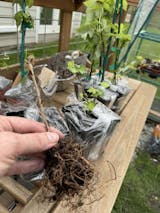
Jeanne Gooseberry
Click for Gooseberry Care Guide
Ribes uva-crispa L. – Jeanne Gooseberry
Jeanne is a late-ripening, dark red dessert gooseberry of unknown European origin. It was observed for 24 years at the USDA National Germplasm Repository in Corvallis, Oregon, though its history before that remains undocumented. This cultivar was named in honor of the late Ms. Cheryl Jeanne Gunning, who worked in the NCGR tissue culture laboratory from 1981 to 1985.
- Bloom Time: Buds break late, with full bloom occurring about one to two weeks after Invicta.
- Ripening Period: Fruit ripens from mid to late July, about a week later than Invicta, and remains ripe for about one week.
-
Fruit Characteristics:
- Deep red when fully ripe
- Weighs approximately 5.0g per berry (7-year average)
- Smaller than Invicta but large for a red-fruited gooseberry
- Full, sweet flavor
- Higher yield than many other gooseberry varieties
- Growth Habit: Somewhat spreading, reaching 5' in height and width, with single nodal thorns.
-
Disease & Pest Resistance:
- Highly resistant to powdery mildew and white pine blister rust
- Less susceptible to aphid damage and sawfly defoliation than other European gooseberries
- Some black leaf spot may appear in summer, but it does not cause significant plant damage
- Best Use: Recommended for home gardens or commercial gooseberry production, particularly in the Pacific Northwest and other temperate climates. Its disease resistance and high fruit quality make it an excellent choice for organic production, potentially extending the red gooseberry harvest season.
Plant Characteristics
- Pest Resistance: Very Good
- Disease Resistance: Very Good
- Drought Tolerance: Fair
- Heat Tolerance: Good
- Humidity Tolerance: Good
- Sun Tolerance: Very Good
- Wet Soil Tolerance: Poor
- Shade Tolerance: Good
- No-Spray Viability: Very Good
- Salt Tolerance: Poor
- Kid-Friendly (Fresh Eating): Very Good
- Deer Resistance: Fair
- Thorns: Yes
- Plant Type: Shrub
- Soil Type: Fertile
- Edible Type: Berry
- Self-Fertile: Yes
This information is accurate to the best of our knowledge. Comments and opinions are always welcome.
